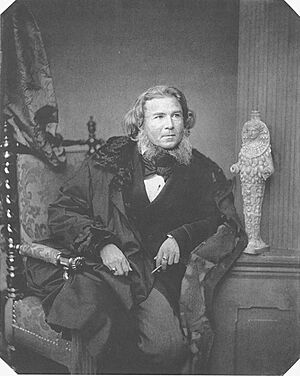Ernst von Lasaulx facts for kids
Peter Ernst von Lasaulx, also known as Ernst von Lasaulx, was a German scholar and politician. He was born on March 16, 1805, and passed away on May 9, 1861. He was known for his work in philology, which is the study of language in historical and literary texts.
Contents
Ernst's Early Life and Family
Ernst von Lasaulx was born in Koblenz, a city in Germany. He was the oldest son of a famous architect named Johann Claudius von Lasaulx. His grandfather, Peter Ernst Joseph von Lasaulx, was an important official in Koblenz.
Ernst had several brothers and sisters. One of his sisters, Amalie von Lasaulx, became a nun known as Sister Augustine. She was in charge of a hospital in Bonn. Ernst's uncle was Johann Joseph von Görres, a well-known priest and writer.
Studies and Travels
From a young age, Ernst Lasaulx was very interested in ancient philosophy. He studied at the University of Bonn and later at the Ludwig Maximilian University of Munich. There, he focused on the ideas of important thinkers like Friedrich Wilhelm Joseph Schelling and Franz Xaver von Baader. Ernst later married Baader's daughter.
After finishing his studies, Ernst spent four years traveling. He visited many important historical places in Austria, Italy, Greece, and Palestine. His trip to Athens was special because he went with Prince Otto of Wittelsbach, who was about to become the King of the Hellenes (King of Greece).
When he returned to Germany, Ernst earned his doctorate degree in 1835. He then became a teacher of classical philology at the University of Würzburg. In the same year, he married Julie Josephine Therese von Baader. They had seven children together.
Political Involvement in Cologne
In 1837, something big happened in Cologne. The Archbishop, Clemens August von Droste-Vischering, was arrested by the Prussian government. This event shocked many Catholics in Germany. Ernst von Lasaulx, along with his uncle, wrote articles about it. Ernst's article, Critical Remarks about the Cologne Matter, strongly criticized the Prussians.
Even though the government in Würzburg wanted him to stay, Ernst left in 1844. He became a professor at the University of Munich, teaching philology and Aesthetics (the study of beauty and art). He was known for his exciting teaching style.
Ernst also became involved in politics. His actions led to a government minister being dismissed in 1847. This made the university happy, but Ludwig I, the King, was very upset. The King then fired Ernst from his job. However, students and other professors protested this decision.
After being dismissed, Ernst Lasaulx and three other former professors were elected to the national assembly in Frankfort. There, he joined the group of conservatives, who believed in traditional values and institutions.
Ernst's Writings
In 1860, Ernst von Lasaulx dedicated his book, "Philosophy of Fine Arts," to Emilie Linder. She was a painter and a smart person living in Munich.
 | Bessie Coleman |
 | Spann Watson |
 | Jill E. Brown |
 | Sherman W. White |


